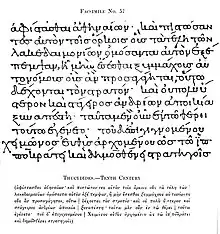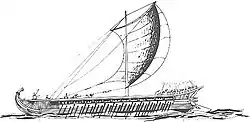History of the Peloponnesian War
The History of the Peloponnesian War tells the story of the Peloponnesian War in Ancient Greece. It was written by Thucydides, an Athenian general who served in that war. The war was fought between the Peloponnesian League (led by Sparta) and the Athenian league (led by Athens). The war lasted more than 20 years.

Many historians regard this History of Thucydides as one of the earliest scholarly works of history.
Historical method
Thucydides' History made a number of contributions to early historiography. Many of his principles have become standard methods of history writing today, though others have not.
Chronology
One of Thucydides' major innovations was to use a strict standard of chronology, recording events by year, each year consisting of the summer campaigning season and a less active winter season. As a result, events that span several years are divided up and described in parts of the book that are sometimes quite distant from one another, causing the impression that he is oscillating between the various theatres of conflict. This method contrasts sharply with Herodotus' earlier work The Histories, which jumps around chronologically.
Speeches
Another feature of the work is that Thucydides writes dozens of speeches of the most important figures who were engaged in the war. Thucydides heard some of these speeches himself but some of the speeches he wrote without knowing exactly what was really spoken.[1]
Neutral point of view
Thucydides wanted his writings "to last for ever" (1.22.4). Therefore he tried to be as neutral as possible though as a general of Athens that was difficult for him.[2]
Role of religion
The gods play no active role in Thucydides' work. This is very different to Herodotus, who frequently mentions the role of the gods. Instead, Thucydides regards history as being caused by the choices and actions of human beings.
The History concentrates on the military aspects of the Peloponnesian War, but it uses these events as a medium to suggest several other themes as well, for instance to show degenerative effects of war on humanity itself. For the most part, the History does not discuss topics such as the art and architecture of Greece, but speaks of the development of military technologies rather often.

The History explains that the cause of the Peloponnesian War was the "growth in power of Athens, and the alarm which this inspired in Sparta" (1.23.6). The Spartans represent a more traditional and less expansive power.
Sources
Thucydides almost never names his informants. This is in contrast to Herodotus, who frequently mentions multiple versions of his stories and allows the reader to decide which is true.
Influence
Thucydides' History has been enormously influential in both ancient and modern historiography.
Outline of the Work
- Book 1
- The state of Greece from the earliest times to the commencement of the Peloponnesian War, also known as the Archaeology. 1.1-1.19.
- Methodological excursus. 1.20-1.23.
- Causes of the war (433-432 BC) 1.24-1.66.
- The Affair of Epidamnus. 1.24-1.55.
- The Affair of Potidaea. 1.56-1.66.
- Congress of the Peloponnesian League at Lacedaemon. 1.67-1.88
- The Speech of the Corinthians. 1.68-1.71.
- The Speech of the Athenian envoys. 1.73-1.78.
- The Speech of Archidamus. 1.80-1.85.
- The Speech of Sthenelaidas. 1.86.
- From the end of the Persian War to the beginning of the Peloponnesian War, also known as the Pentacontaetia. 1.89-1.117.
- The progress from supremacy to empire.
- Second congress at Lacedaemon and the Corinthian Speech. 1.119-1.125.
- Diplomatic maneuvering. 1.126-1.139.
- Excursus on Cylon. 1.126-1.127.
- Excursus on Pausanias and Themistocles. 1.128-1.138
- Pericles' first speech. 1.140-1.145.
- Book 2 (431-428 BC)
- War begins with Thebes' attempt to subvert Plataea. 2.1-2.6.
- Account of the mobilization of and list of the allies of the two combatants. 2.7-2.9.
- First invasion of Attica. 2.10-2.23.
- Archidamus leads the Peloponnesian army into Attica. 2.10-2.12.
- Athenian preparations and abandonment of the countryside. 2.13-2.14.
- Excursus on Athenian synoikism. 2.15-2.16.
- Difficult conditions in Athens for refugees from countryside. 2.17.
- Archidamus ravages Oenoe and Acharnai. 2.18-2.20.
- Athenian fury and anger at Pericles. 2.21-2.22.
- Athenian naval counter-attacks along coast of Peloponnese and islands. 2.23-2.32.
- Pericles' Funeral Oration. 2.34-2.46.
- The plague of Athens. 2.47-2.54.
- Second invasion of Attica and Athenian naval counter-attacks. 2.55-2.58.
- Pericles' third speech, defending his position and policy. 2.59-2.64.
- Thucydides' estimate of Pericles' qualities and the causes for Athens' eventual defeat. 2.65.
- Diplomacy and skirmishes in Thrace, the islands, and the Northeast. 2.66-2.69.
- Fall of Potidaea. 2.70.
- Investment of Plataea. 2.71-2.78.
- Naval victories of Phormio in the Northeast. 2.80-2.92.
- Threat of raid on the Piraeus. 2.93-2.94.
- Thracian campaign in Macedonia under Sitalces. 2.95-2.101.
- Book 3 (428-425 BC)
- Annual invasion of Attica. 3.1.
- Revolt of Mytilene. 3.2-3.50.
- Fall of Plataea. 3.20-3.24, 3.52-68.
- Some Plataeans escape. 3.20-3.24.
- Plataea surrenders. 3.52.
- Trial and execution of the Plataeans. 3.53-3.68.
- Speech of Plataeans, 3.53-3.59.
- Speech of the Thebans. 3.61-3.67.
- Revolution at Corcyra. 3.70-3.85.
- Thucydides' account of the evils of civil strife. 3.82-3.84.
- Athenian campaigns in Sicily. 3.86, 3.90, 3.99, 3.103, 3.115-3.116.
- Campaigns of Demosthenes in western Greece. 3.94-3.98, 3.100-3.102, 3.105-3.114.
- Spartans establish Heracleia in Trachis. 3.92-3.93.
- Athenians purify Delos. 3.104.
- Book 4 (425-423 BC)
- Annual invasion of Attica. 4.2.
- Athenians en route to Sicily occupy Pylos in the Peloponnese. 4.2-4.6.
- King Agis of Sparta cuts short the invasion of Attica to return to the Peloponnese. 4.6.
- Concerted Spartan attack on the Athenian fort at Pylos. 4.8-4.15.
- The Athenian general Demosthenes coordinates the defense of Pylos and rouses the troops with a speech. 4.9-4.10.
- The Spartan commander Brasidas distinguishes himself for bravery. 4.11-4.12.
- The Athenians defeat the Spartan assault on Pylos and cut off a garrison of Spartiates on the adjacent island of Sphacteria. 4.13-4.14.
- The Spartans, concerned for the men on the island, conclude an immediate armistice and send an embassy to Athens to negotiate peace. 4.13-4.22.
- The speech of the Spartan ambassadors offers to peace and alliance to Athens in exchange for the return of the men on Sphacteria. 4.17-4.20.
- The Athenian Cleon, speaking in the Assembly, encourages the Athenians to demand the return of the territories surrendered by Athens at the conclusion of the First Peloponnesian War. 4.21-4.22.
- Events in Sicily. 4.24-4.25.
- Siege of the Spartiates on Sphacteria continues without result. 4.26-4.27.
- Cleon takes command at Pylos. 4.27-4.29.
- Battle of Sphacteria results in the capture of all the Spartiates trapped there. 4.29-4.41.
- Nicias leads an Athenian attack on Corinth. 4.42-4.45.
- End of Corcyraean revolution. 4.46-4.48.
- Athenians capture Cythera, an island off the Peloponnese, and Thyrea, a town in the Peloponnese. Sparta is hemmed in on all sides and desperate. 4.53-4.57.
- Sicilian cities make peace in conference at Gela, frustrating Athenian designs on the island. 4.58-65.
- Speech of Hermocrates at Gela. 4.59-4.64.
- Athenian attack on Megara. 4.66-4.74.
- Capture of Nisaea. 4.69.
- Inconclusive engagements at Megara. 4.73.
- Megara eludes Athenian capture. 4.74.
- Invasion of Boeotia. 4.76, 4.89-4.101.2.
- Athenians occupy temple at Delium. 4.90.
- Battle of Delium results in Athenian retreat. 4.91-4.96.
- Boeotians refuse to return Athenian dead until Athenians relinquish the shrine of Delium. 4.97-4.99.
- Boeotians assault the Athenian in the temple and burn it down. 4.100.
- Brasidas marches through Thessaly to Thrace and begins to cause Athenian subject cities to revolt. 4.78-4.88.
- Speech of Brasidas to the Acanthians. 4.85-4.87.
- Fall of Amphipolis to Brasidas. 4.102-4.108.
- Continued successes of Brasidas in Thrace. 4.111-4.135.
- Brasidas secures the revolt of the garrison of Torone. 4.110-4.116.
- One-year armistice between Athenians and Spartans. 4.117-4.118.
- Scione revolts from Athens to Brasidas. 4.120-4.123.
- Truce breaks down. 4.122-4.123.
- Athenians retake Mende and besiege Scione. 4.129-4.131.
- Book 5 (422-415 BC)
- Death of Cleon and Brasidas
- Peace of Nicias
- Feeling against Sparta in the Peloponnese
- League of the Mantineans, Eleans, Argives, and Athenians
- Battle of Mantinea and breaking up of the League
- The Melian Dialogue
- Fate of Melos
- Book 6 (415-414 BCE)
- The Sicilian Expedition
- Affair of the Hermae
- Departure of the expedition to Sicily
- Parties at Syracuse
- Story of Harmodius and Aristogiton
- Disgrace of Alcibiades
- Inaction of the Athenian army
- Alcibiades at Sparta
- Investment of Syracuse
- Book 7 (414-413 BC)
- Arrival of Gylippus at Syracuse
- Fortification of Decelea
- Successes of the Syracusans
- Arrival of Demosthenes
- Defeat of the Athenians at Epipolae
- Folly and obstinacy of Nicias
- Battles in the Great Harbour
- Retreat and annihilation of the Athenian army
- Book 8 (413-411 BC)
- Revolt of Ionia
- Intervention of Persia
- The war in Ionia
- Intrigues of Alcibiades
- Withdrawal of the Persian subsidies
- Oligarchical coup d'état at Athens
- Patriotism of the Athenian army at Samos
- Recall of Alcibiades to Samos
- Revolt of Euboea and downfall of the Council of the Four Hundred
- Battle of Cynossema
Notes
- In Thucydides' words: "what was called for in each situation" (1.22.2).(Donald Kagan, "The Speeches in Thucydides and the Mytilene Debate," Yale Classical Studies (1975) 24:71-94.)
- Ernst Badian argues Thucydides had a pro-Athenian bias. (Ernst Badian, "Thucydides and the Outbreak of the Peloponnesian War. A Historian's Brief" in Conflict, Antithesis and the Ancient Historian, ed. June Allison, (Columbus 1990), pp. 46-91.)
Internet Sources
- Lewis, John (January 6, 2004). "Thucydides and the Discovery of Historical Causation". StrongBrains. Archived from the original on October 11, 2007. Retrieved November 7, 2007.
- Crane, Gregory (1998). Thucydides and the Ancient Simplicity: The Limits of Political Realism. Berkeley: University of California Press.
Secondary Sources
- Connor, W. Robert, Thucydides. Princeton: Princeton University Press (1984). ISBN 0-691-03569-5.
- Hornblower, Simon, A Commentary on Thucydides. 2 vols. Oxford: Clarendon (1991-1996). ISBN 0-19-815099-7 (vol. 1), ISBN 0-19-927625-0 (vol. 2).
- Hornblower, Simon, Thucydides. London: Duckworth (1987). ISBN 0-7156-2156-4.
- Orwin, Clifford, The Humanity of Thucydides. Princeton: Princeton University Press (1994).
- Romilly, Jacqueline de, Thucydides and Athenian Imperialism. Oxford: Basil Blackwell (1963). ISBN 0-88143-072-2.
- Rood, Tim, Thucydides: Narrative and Explanation. Oxford: Oxford University Press (1998). ISBN 0-19-927585-8.
- Strassler, Robert B, ed. The Landmark Thucydides: A Comprehensive Guide to the Peloponnesian War. New York: Free Press (1996). ISBN 0-684-82815-4.
Translations
- Thomas Hobbes, 1628: full text
- William Smith, 1753
- Richard Crawley, 1874: full text Archived 2004-10-16 at the Wayback Machine
- Benjamin Jowett, 1881: full text Archived 2016-12-11 at the Wayback Machine
- Edgar C. Marchant, 1900
- Charles Forster Smith, 1919
- Rex Warner, 1954
- John H. Finley, Jr., 1963
- Walter Blanco, 1998
.jpg.webp)